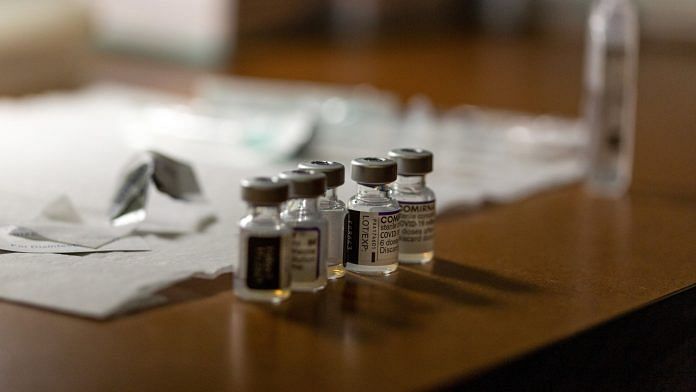London: A year ago, scores of countries committed to Covax, the program set up to deliver Covid-19 vaccines equitably to every corner of the planet. Now the initiative is falling short of its goals.
Facing a 25% cut to Covax’s supply forecast for the year, its partners are calling on countries that already have enough doses to give up their place in the queue. They also want vaccine makers to be more transparent about their supply arrangements to ensure developing countries aren’t being disadvantaged.
The organizations behind Covax, including the vaccine alliance Gavi, cite an array of challenges, including export bans and hurdles some companies have encountered in scaling up production. Covax expects to have access to about 1.4 billion doses by the end of the year, the groups said Wednesday. That’s down from a June forecast for about 1.9 billion.
Although Covax backers said they expect the program to speed up in the coming months, health advocates worry it won’t be fast enough. About 10,000 Covid deaths are occurring each day, Soumya Swaminathan, the World Health Organization’s chief scientist, said in a briefing with reporters.
“A few months in the pandemic is a very long time,” Fatima Hassan, director of the Health Justice Initiative, a non-profit in Cape Town, said by phone.
The campaign to immunize the world has run into problems after wealthy countries raced ahead in protecting their own populations. Only a fifth of people in lower-income countries have received a first dose, compared with 80% in higher-income nations, according to Gavi and its partners.
That glaring gap has put pressure on wealthy governments to step up. But so far, they’ve delivered a paltry amount of the supplies pledged to poorer countries, and some are moving forward with plans for booster shots to try to fight the delta variant. Less than 15% of the more than 1 billion doses pledged by Group of Seven countries and the European Union have been delivered, analytics firm Airfinity Ltd. said Sunday.
The WHO’s top scientist expressed concern that some countries are talking about boosters even though there is insufficient evidence that vaccines are failing to protect against severe disease. And in many nations, even health workers aren’t yet protected.
The continuing death toll “is not something we should be seeing 20 months into the pandemic, especially since we have all of these tools that have been developed in record time,” Swaminathan said.
Tedros Adhanom Ghebreyesus, the WHO’s director-general, on Wednesday called for a moratorium on boosters until at least year-end, adding that manufacturers prioritizing deals with richer nations had left low-income countries “deprived of the tools to protect their people.”
The initial goal of the Covax campaign was to have 2 billion vaccine doses available by the end of 2021. It now expects to reach that milestone in the first quarter of next year. The latest figures show Covax has delivered about 243 million doses to 139 countries.
While Covax has binding agreements with manufacturers for more than 4 billion doses, it has faced delays in accessing them, Seth Berkley, Gavi’s CEO, wrote Sept. 3 in Project Syndicate. Without greater clarity on vaccine orders, it’s impossible to know if the holdups are due to production challenges or preferential treatment, he said.
Also read: Can Covid vaccine improve your mental health? Yes, says US study
Delayed shipments
The effort has been hamstrung by delays in shipments from a key manufacturer of the shots, the Serum Institute of India. Earlier this year, India halted exports to tackle a devastating outbreak at home. Covax also pointed to challenges at manufacturing sites that have affected supply of the Johnson & Johnson and AstraZeneca Plc vaccines.
“This is of course bad for the whole world, as we’ve seen the dreadful consequences that take hold when the virus is left to roam unchecked,” Berkley said. “We cannot afford further delays.”
On Tuesday, drugmakers reiterated calls for governments to share vaccine doses, saying G-7 countries have enough supplies to both satisfy their own needs and increase stocks available for low- and middle-income countries. Wealthy nations will probably have about 1.2 billion extra doses available to redistribute by the end of the year, according to Airfinity.
“I believe that we will be able — if there’s political will, political leadership — to reach full vaccine equity most likely by mid next year,” Thomas Cueni, director general of the International Federation of Pharmaceutical Manufacturers & Associations, said in a briefing with reporters.
Global output is rising steadily and could cross 12 billion doses by the end of 2021, including shots in China, Airfinity estimates.- Bloomberg
Also read: Covid travel can be an opportunity, not just a risk



